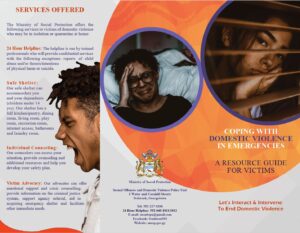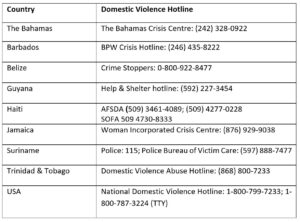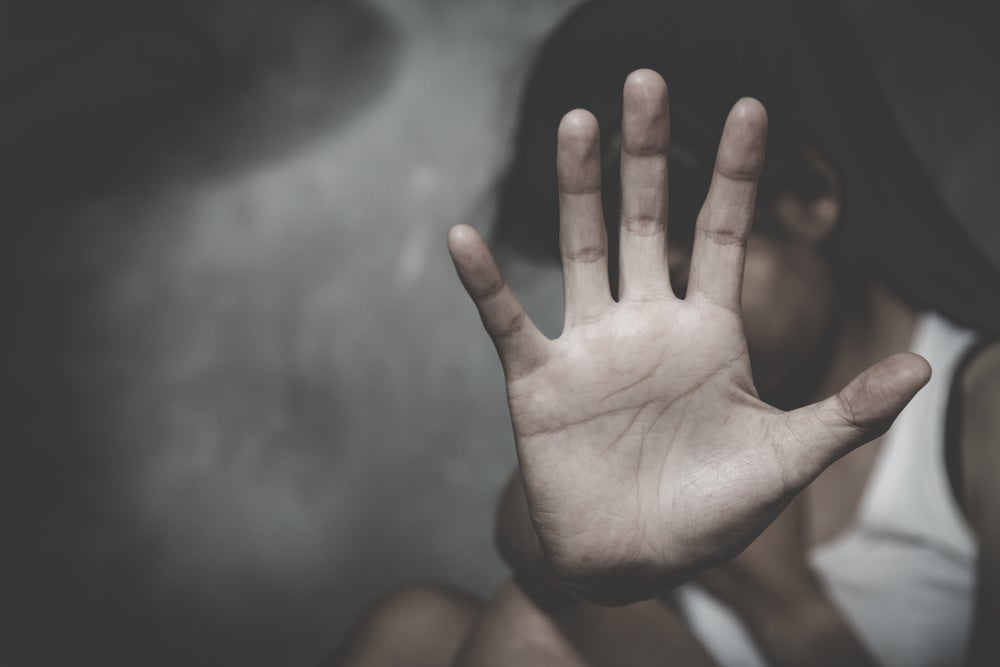THE SITUATION
Most countries worldwide have adopted public health measures to minimize the risk of contagion and spread of COVID-19. For the Caribbean, many of these measures include “stay at home” orders and the closure of entertainment and relaxation venues such as bars and beaches. And while these measures are needed to stop the spread of COVID-19, the quarantines can increase the number of family violence cases.
A 2018 UNDOC study on Gender-related Killing of Women and Girls[1] provides statistical data showing the “home [as] the most likely place for a woman to be killed.” Worldwide, 1 in 3 women victims of homicide was murdered by an intimate partner and nearly 1 in 4 by other family members. According to the study, in Guyana, 85% of women killed were murdered by an intimate partner or family-related homicide; in Jamaica, 90% of IPV victims were women; in Trinidad and Tobago, nearly one-third of female homicide were IPV and family-related. Also, it is estimated that there is at least a 45% chance that children will face abuse in households experiencing domestic abuse[2]. There is strong evidence that children who are often victims of physical and sexual violence are at a greater risk of replicating this behavior as adults.
Fast forward to 2020. Evidence worldwide has shown that domestic abuse cases are increasing due to the confinement measures that tend to reinforce abusive behavior. Isolated, anxious and stressed from loss of wages, potential abusers who find themselves without an outlet, may become more aggressive, searching for means of power and control. The lockdown makes leaving the house and seeking help a luxury for potential victims of family violence.
In Washington DC, a non-profit agency indicated that calls to its hotline doubled during the first two weeks since the stay-at-home orders were imposed[3]. Calls to domestic violence hotlines increased 40% in Argentina and 60% in Mexico; 30% and 18% in France and Spain respectively[4]. The reverse could also be true: a decrease in the number of calls may well mean that victims may be unable to call a hotline because abusive partners are able to maintain total surveillance on potential victims.
WHAT WE ARE DOING
Based on information obtained from five Caribbean countries, the provision of services continues, although at levels lower than pre-COVID. Gender affairs bodies have indicated that their staff is working from home and are operating the hotlines, shelters remain open although with less beds due to the quarantine measures and child protective services are functioning. Police stations are open on schedule and courts are providing protective orders. Public institutions are beginning to set up national response mechanisms, by including information on family violence with the dissemination of sanitary measures.

Still, many shelters and counseling centers have found themselves understaffed; vulnerable persons residing in rural areas have limited access to the internet and transportation; staff are reluctant to work additional hours; and revenues are dwindling.
Obviously reaching out to these services and places mean that the victim is able to leave home or call; or the perpetrator must leave home. Both alternatives are difficult under the quarantine measures. Some countries have tried to counter the effect of these measures on family violence. For instance, in France[5], domestic violence victims can seek help in pharmacies or supermarkets by using a code word (Masque 19). The Governor of Buenos Aires, Argentina, has provided subsidies to meet emergency spending related to protecting victims of family violence, such as transport, shelter and medical expenses[6]. The World Health Organization has provided posters advising healthy parenting tips[7].
WHAT HAVE YOU DONE? WHAT CAN YOU DO?
Let us know what you, your community or your place of work are doing to protect women and children from violence during these difficult times. If you see something say something. Stay in touch with your neighbors, even if across the fence. Intimate Partner Violence and child abuse have signs, some physical most emotional. The killing of women by their partners is often the culmination of long-term violence and can be prevented.
If you or someone you know is experiencing violence at home, please call the domestic violence hotline in your country:

Watch our webinar on why periods of high stress can cause violence to increase, particular risk factors, as well as what families and individuals in the Caribbean can do to cope.
The Caribbean and Coronavirus: Family Violence from el BID – the IDB on Vimeo.
[1] https://www.unodc.org/documents/data-and-analysis/GSH2018/GSH18_Gender-related_killing_of_women_and_girls.pdf
[2] https://blogs.iadb.org/igualdad/en/spare-the-rod-and-spoil-the-child-discipline-and-violence-in-the-caribbean/
[3] https://www.washingtonpost.com/local/domestic-violence-will-increase-during-coronavirus-quarantines-and-stay-at-home-orders-experts-warn/2020/03/26/04e63d6a-6d37-11ea-b148-e4ce3fbd85b5_story.html
[4] https://www.nytimes.com/2020/04/06/world/coronavirus-domestic-violence.html
[5] https://france3-regions.francetvinfo.fr/auvergne-rhone-alpes/rhone/lyon/coronavirus-dispositifs-alerte-pharmacies-centres-commerciaux-lutter-contre-violences-conjugales-1808546.html
[6] https://www.telam.com.ar/notas/202003/446034-autorizan-al-ministerio-de-las-mujeres-a-otorgar-subsidios-para-casos-de-violencia-de-genero.html
[7] https://www.who.int/emergencies/diseases/novel-coronavirus-2019/advice-for-public/healthy-parenting


Leave a Reply